‘My name could have been on list of dead'
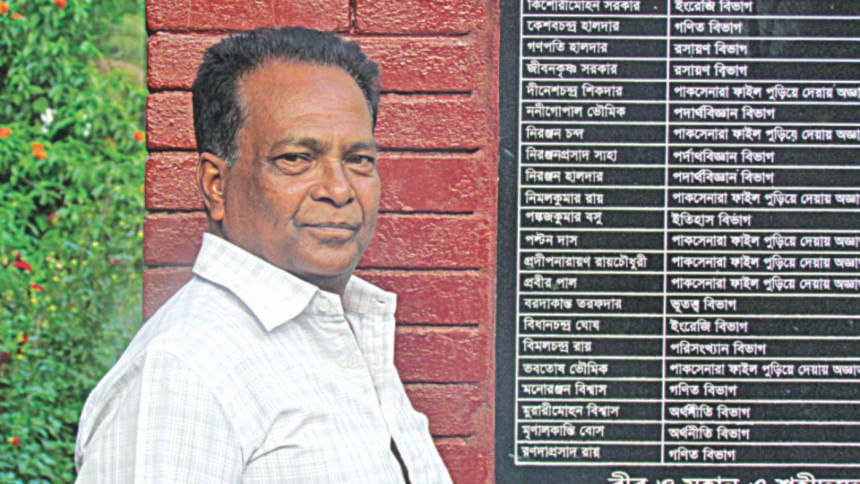
Everything changed as soon as twilight descended on Jagannath Hall of Dhaka University on March 25, 1971. A ghostly calm took hold of the entire campus.
In their two-room, tin-shed staff quarter at the hall, the family of Ram Bihari Das was discussing the tension that stemmed from Yahya Khan's dilly-dallying over handing over power to prime minister-elect Bangabandhu Sheikh Mujibur Rahman.
The uneasiness turned into foreboding when they heard that people, particularly university students, started setting up barricades with trees, bricks and whatever else they could get.
Anxious, Rabindra Mohan Das, Ram's youngest son, was preparing to go to bed after dinner. Suddenly, some distant sounds of gunshots broke the stillness of the night.
"My elder brother told me: 'It might be coming from the Rajarbagh police station'. It was around 11:00pm," said Rabindra, now 60.
A little later, they heard more gunshots, this time from Pilkhana area. For the rest of the night, Rabindra experienced firsthand the horror unleashed by the Pakistan army on the hall students and staff.
"My name could have been on the list of the dead,” he said pointing to the martyrs' memorial inside the hall, “It was sheer luck that I survived."
Rabindra, who went on LPR from the Provost's Office of Jagannath Hall last month, shared the memories of the fateful night with The Daily Star recently.
In 1971, he was a class-eight student at New Paltan High School in Azimpur. The family used to live in the staff quarter by the western side of the boundary wall of the hall. Around 20 other families lived there. Yards away, there was a tin-roofed dormitory for students.
Having heard the gunshots, Rabindra came out of the room to see what was going on.
"Soldiers were surrounding the hall,” he saw, as he cringed in fear.
He went back to the room and within seconds the power went off. Soon, tanks and truckloads of soldiers broke through the boundary wall opposite the UOTC building (now BNCC).
They also entered the dormitory through the north and the south gates and fanned out.
"There was firing and explosion. Rat-a-tat-tat, boom, boom! Crack! It was deafening," said Rabindra, having goose bumps on his cheek.
Tracer fire lit up the night sky. The sharp cracks of rifles with shelling of mortars were all around. Operation Searchlight had just begun.
"Amid constant sounds of gunshot, we heard screams and voices pleading for life," Rabindra said.
His elder brother Fanindra Mohan Das, a lab assistant of East Pakistan University of Engineering and Technology (now Buet), Fanindra's wife and their little son were also at home. His father, Ram Bihari Das, who used to work at the Provost's office of the hall, used to stay in the office room at night.
Bullets were flying overhead; some struck the tin roof. Panicked, they hid under the cot, but the CRACK and BOOM got louder and louder. This continued for a while.
He was not ready for what came next.
Around 2:30am, a group of seven to eight soldiers approached their home. They dragged night guard Shiba Pada Kuri along. He was crying and calling Rabindra's brother for help.
But before they could offer any help, the soldiers broke open their doors.
"Tum log kaun ho? (who are you people?)," one soldier asked Fanindra.
"Hum toh sweeper hai sahab; drain saaf karte hai (we're sweepers, we clean drains)," he replied.
"Idhar malaun kidhar hai... chhatra kidhar hai? (where are the Hindus and the students)?"
"Yeha par koi chhatra hai nehi. Malaun chala geya... (no student lives here. Hindus are all gone...)," was his reply.
The soldiers then beat Fanindra with rifles and took him with them to search the rooms.
Fanindra could speak Urdu and English a bit, which he learnt while working at a telephone exchange. Rabindra too understood Urdu a bit and all the conversations between the soldier and his brother took place in front of him.
Around half an hour after taking his brother, who somehow managed to flee, the soldiers returned. This time around 25 of them. They set their home on fire. The family members came out and Rabindra ran towards the cowshed to rescue their five cows.
He took some of the cows out of the cowshed and tried to take them towards the corner of the playground for safety. Then he saw a huge number of soldiers taking position.
"I couldn't believe my eyes. The soldiers were all in position with arms. I was baffled and didn't know what to do," he said.
They caught him.
"They could have shot me. Instead they caught me," Rabindra said.
Thirty other people were caught. All of them, including Rabindra, were taken to a room used as a cowshed that belonged to Dabir Uddin, the then chief engineer of Dhaka University.
It was not dawn yet. One soldier drew a line in front of the door of the room and thundered in Urdu: "Iska bahar jaiyega to goli maar dunga (if you cross the line, we'll shoot you)."
"We were all like corpses," Rabindra said, adding that there were a few students among the captives.
As the day broke, the soldiers came to the room. Out of the 31, they sorted 15 who were relatively healthier. They forced them to carry the bodies lying inside the halls and put those in a place used for students' long-jump game, a place later marked as the killing field.
Then the Pakistan army asked the 15 to stand in front of the dead and then shot them.
"We saw it from the room," Rabindra said, recalling those moments with his eyes closed. After a brief pause, he opened his eyes and went on: "I was trembling in fear, crying."
It was now the turn for the rest 16.
Three relatively older soldiers came and counted them: one, two, three….
"I thought my time has come. Observing me intensely, one soldier hit my waist with his rifle. I was thrown a few feet away," he said.
Lying and groaning in pain, Rabindra tried to hide himself in a small hole-like place.
Then the soldiers took the 15 to the place and forced them to carry corpses from different places. This done, they lined them up and shot them down.
"It was all happening before my eyes," he said.
The soldiers waited there for 15 to 20 minutes and then left.
Rabindra came out of his hiding place and saw a man in the heap of bodies wave at him. He ran to him. The man wanted some water. Rabindra rushed to the pond, about 100 yards from the place. He cupped his hands and tried to bring some water. But by the time he reached where the man was lying, all the water dripped through his fingers.
Then he found a broken pot and carried some water to him. But the man breathed his last as he tried to pour some in his mouth.
After the soldiers left, those who survived the massacre started looking for their loved ones. But there was hardly anyone around, only bodies and scattered flesh.
"Oh! I've never seen so many corpses," said Rabindra.
But he is lucky by all counts. His father, brother, sister-in-law and nephew were all alive. In the afternoon, they left the hall fearing that the soldiers would return.
"We left the hall for an uncertain future ahead," he said.

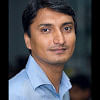
 For all latest news, follow The Daily Star's Google News channel.
For all latest news, follow The Daily Star's Google News channel. 

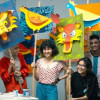
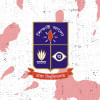

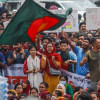
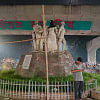


Comments